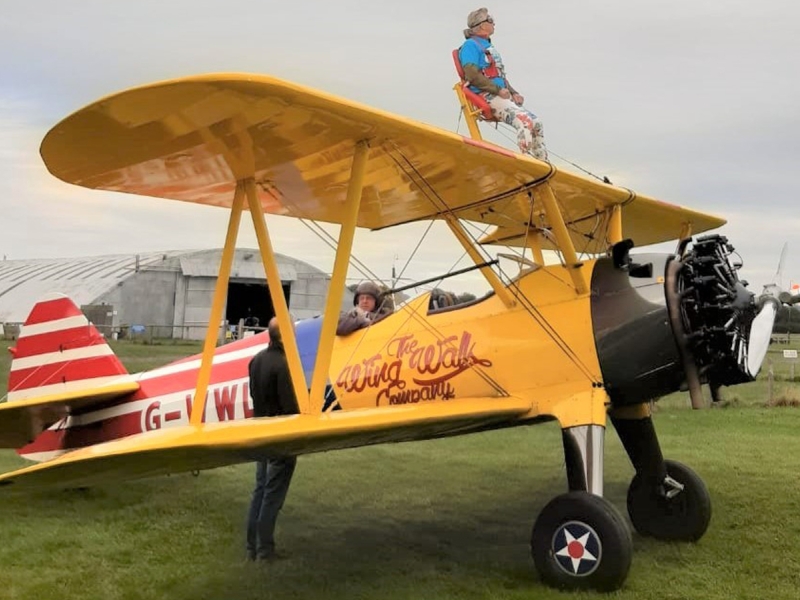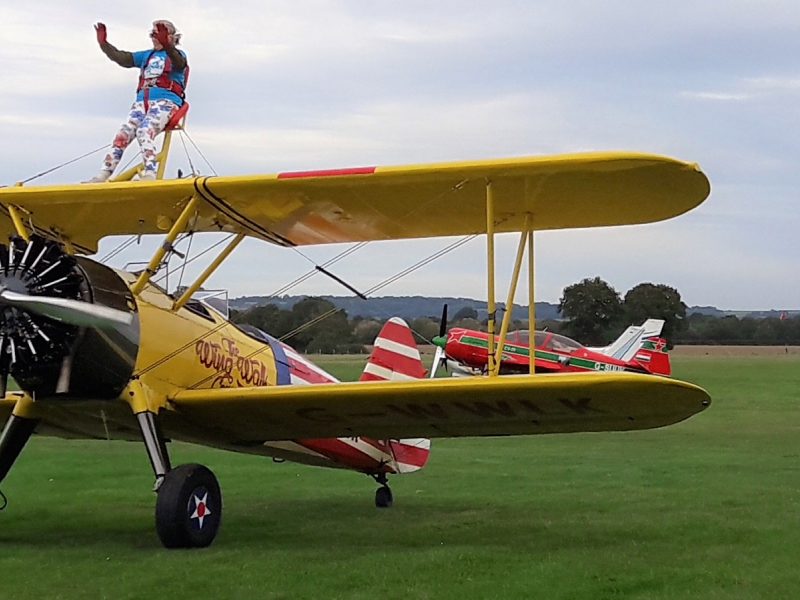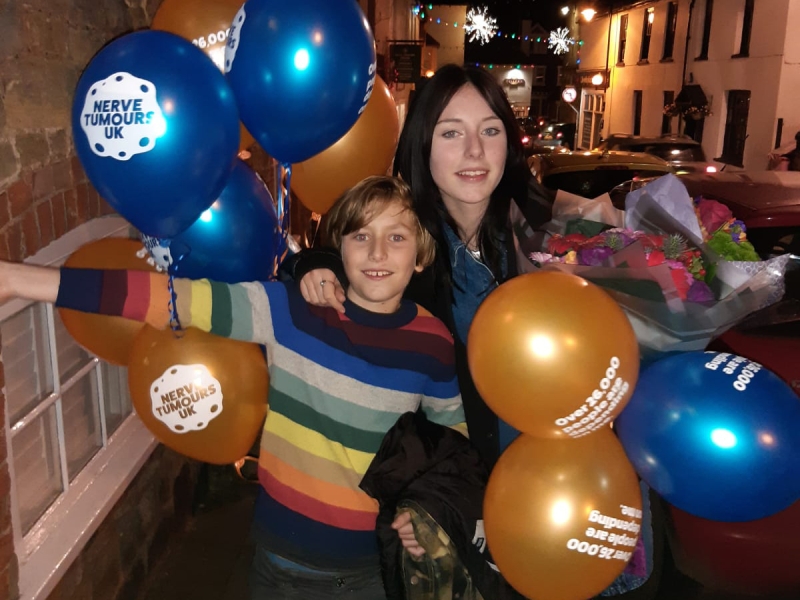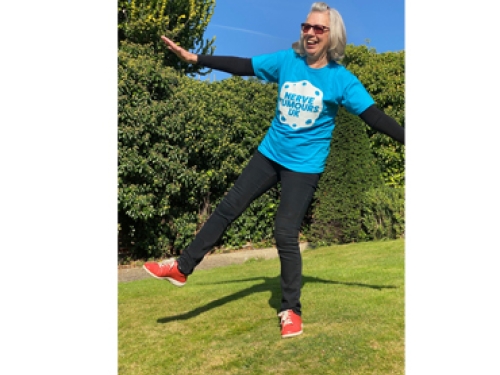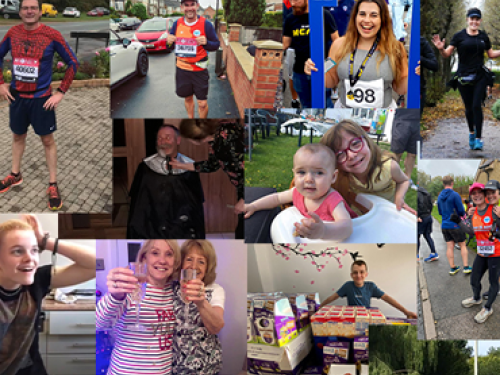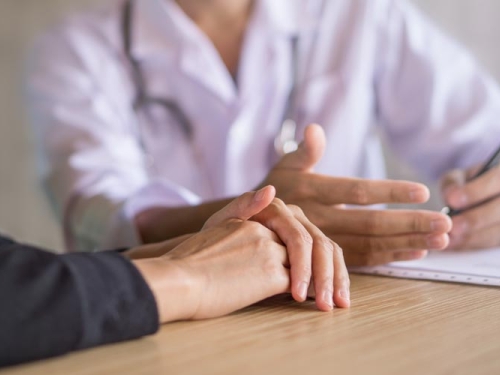Tricia’s Wingwalk fundraiser
20 October 2021
A challenge for my three quarters of a century
A Wing Walk wasn’t much of a challenge for me at all, the most challenging part was gathering enough suitable clothes to keep me warm. We were asked to wear tight fitting clothing, so that added to the challenge. I had left it until the eleventh hour but, with five layers, including my husband Phil’s thermal long Johns and vest and son-in-law’s windproof cycling zip-up, I was quite warm. Unfortunately, I looked and felt like the Michelin Man with much of it bunching up around my middle.
The decision to book a wing walk was made very spontaneously in September, after I had read an article about a lady doing one for charity. It was a bit different and I could not think of any other challenge. As a child in the 1950s, I used to dream that I was flying over the garden and I could see all the beautiful flowers and wildlife. It is one of only three dreams in my life that I have remembered. The next nearest thing to that, was a hang gliding course in the 1980s. It was supposed to be a weekend course but six weeks later I had not completed it as it was so weather dependant – launching downhill and into the wind. I did gain a lot of experience in rigging and de-rigging hang gliders but gave up due to the distance I had to travel each weekend. Sixty feet up for about 30 seconds had to satisfy me. I sat next to an ex-RAF station commander at a lunch a few years ago and hang gliders were mentioned. I said that you didn’t see many these days and he replied that it was because they were all dead. Maybe a good thing that I didn’t continue.
Now you will understand why the wing walk appealed. Of course, that is weather dependant too. It was booked for Monday 18th but whilst I was away, on the Thursday during the week before, I was asked if I would like to change it to the weekend as the weather was not looking good for the Monday. Another fairly quick decision, as I knew that if Monday was no good, it would be put off until the spring and I didn’t want to wait that long.
The journey to Headcorn in Kent was quicker on a Sunday – just over two hours – although Phil defied the SatNav until the last few miles. Lovely journey along country roads. It would have been quicker on the M25 – or would it? – once you are stuck, you are stuck.
After a safety briefing etc, I didn’t have to wait very long for my turn. It was interesting watching others and the paragliders swirling above. They had to land before any planes could take off. Still, I didn’t feel worried. The plane had just refuelled so no risk of running out. Onto the wing. Climbing up was easier than I thought it would be. The pilot, Richard, was lovely – he asked me how extreme I would like the flight to be. Well – it had to be a challenge so I just said that I didn’t like hump back bridges. ‘It doesn’t feel anything like that’, he said, ‘or fairground rides. I will look after you’. He then reminded me that if I was enjoying it I should put my arms out often and if I had them down for very long, he would land straight away. Certainly I didn’t want that but I had to shut my eyes a few times, when it seemed as though the pilot was going to nosedive into the ground. It was quite thrilling just the same.
Goggles on, ear plugs in, engine started and about to pull away when a rogue bi-plane appeared above, looping the loop and other manoevers. Had to wait. Engine off. Sat there for what seemed like an eternity. Watching him made me feel a bit sick so I tried not to watch. Later I learnt that the pilot retired some years ago but still insisted on flying at weekends. Some people... but, as you get older, old habits die hard. Some of you will know that!
We pulled away, my family waving furiously. It was very bumpy across the airfield, before take off and I only realised that we had left the ground when the bumps stopped. I ordered a video of the flight which has a commentary by the pilot. It doesn’t include anything whilst you are stationary, so my family took a few of those. Up and away. For safely reasons. the pilot stays close to the airfield and surrounding fields so that he can land quickly if necessary. We went around the same circuit a few times and I was amazed that that sheep, cattle and horses were completely unfazed when we dived quite low over their fields. Apparently they are used to it – well you would be if you grew up with it, I suppose. At one point we started flying above a railway line, which made me think of the war. I believe pilots used to navigate by following railways and rivers.
My father was a pilot when I was a child and part of the reason for my challenge. The other reason, was that I wanted to raise funds for Nerve Tumours UK – they support people with Neurofibromatosis, the condition which eventually took my daughter’s life.
After going around a number of times, I was beginning to feel a bit chilled, in spite of my five layers, and my arms were beginning to ache and I didn’t want to keep them down for too long. It wasn’t too long after that we landed, so another bumpy ride across the grass. I arrived to cheering and clapping and it seemed like a hero’s welcome. As I write this on Monday, I have raised over £2000. Still a way to go to reach my target.
Now what will I do to celebrate my 80th? Perhaps win some money and go to the moon? My father said that he would like to do that. What are the chances...?
–"The actual flight was just over ten minutes, it was a wonderful experience - I would like to have been the pilot! For me, it was less scary than a bungee jump or parachute jump or running a marathon! You see so much and I felt very safe."
Watch the video of Tricia's wingwalk - a memorable challenge for her to celebrate her 75th birthday!

